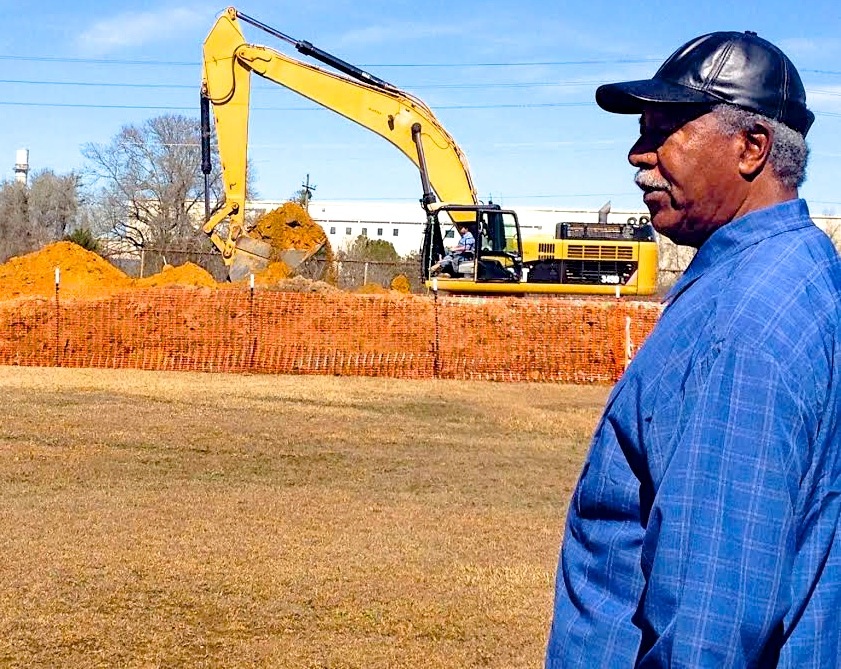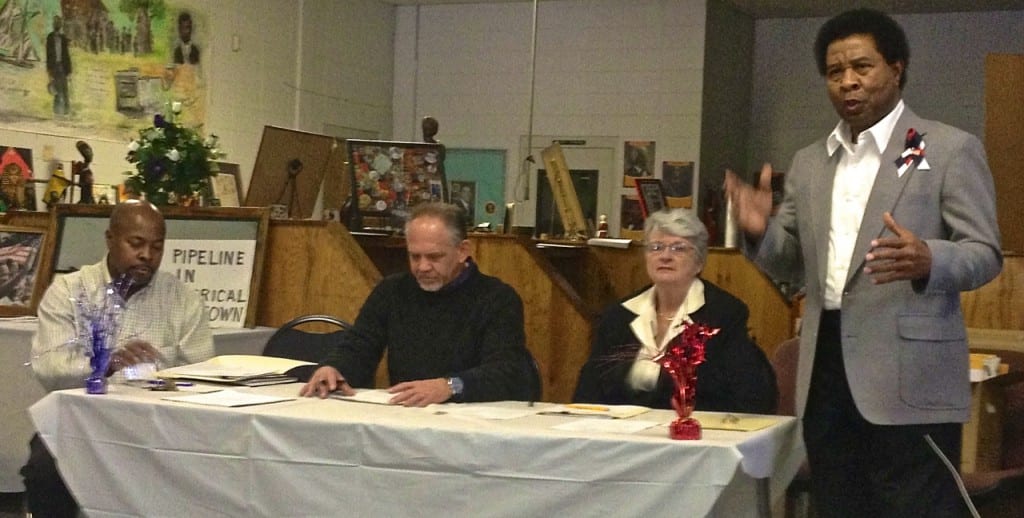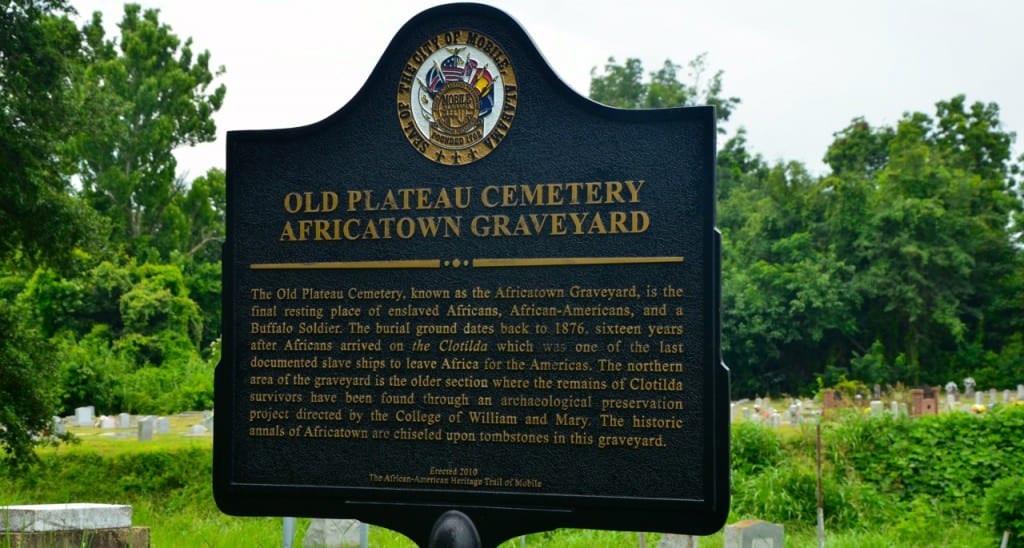School Superintendent Instructs Adults in Non-Critical Thinking, Which Contributes to Environmental Injustice –

Cleon Jones, left fielder of 1969 World Series champion New York Mets, watches oil pipeline trench being dug across the field where he learned to play baseball: Jo Billups
By David Underhill –
MOBILE, Ala. – Enabler. That’s the current jargon for a very old idea. The serpent was an enabler. He didn’t force anything upon Eve. He just helped her decide to do what she wanted with the apple but shouldn’t.
Teachers’ tasks include showing students how to avoid the snares of enablers. But the head of Mobile’s public schools has become an enabler of adult misbehavior.
Superintendent Martha Peek came to the alumni quarters of Mobile County Training School on February 21 for a meeting about a crude oil pipeline. The odd name is a legacy of segregation, when the school system regarded black children as fit for vocational instruction, not academics. But the graduates have retained the name with some pride and have prominently attached the initials MCTS to the wall of their room, which also displays the long history of the school and the surrounding community.
The place was filled with alumni, neighborhood residents, and others wanting the superintendent to explain the clang of steel and chug of heavy machinery as she spoke. This racket came from sections of three-foot-diameter pipe going into a trench dug through the schoolyard.
Africatown
For decades paper mills clattered and fumed and stank across the street from the school. When they closed in the 90’s activists envisioned a transformation of the area. Long before industry overtook this riverside bluff a few miles upstream from downtown, it was home to descendants of the last arriving American slave ship in the mid-19th century. Departure of the paper mills raised hopes of combining a revived residential zone with exhibits and attractions depicting the trans-Atlantic slave trade and the way its human cargoes fashioned new lives for themselves in an alien place. Africatown was the name for this vision.
Instead, other industries sprang up at the paper mill sites and began chewing into the edges of the residential tracts. Recently a tank farm on the south flank of the neighborhood expanded and a proposal came before the Mobile city planning commission for a new tank farm on the north flank so huge it ought to be called a tank city.
The pipeline snaking through the schoolyard connects these tank complexes with other pipelines to refineries elsewhere, and with the downtown terminal of the Canadian National Railroad bringing tar sands crude from Canada, and with oceangoing tankers moving crude to and from global markets. The emerging picture sketches plans by global energy interests to turn Mobile into a major handling hub for fossil fuels. And the school with a pipeline gash across its campus is at the center of the hub.
Superintendent Flunks
The school system’s superintendent denied this connection in her opening remarks and, when asked about it during the discussion period, she denied it again. Enabler.
Several weeks earlier a spokesman for the Chamber of Commerce spoke similarly at a City Hall meeting about the expanding tank farms. He advised officials and citizens in attendance to ignore the connections among these fossil fuel projects. Rather, he said, consider each proposed new tank farm on its merits. He would not have been doing his job if he had spoken otherwise.
But the superintendent’s job description does not include diverting attention from the full mutual links and consequences of the ongoing fossilizing developments. Her job is education. The meeting at the school gave her a chance to provide education, via the adults present to families and neighborhoods, via the media present to the whole community. But she provided mis-education by denying the schoolyard pipeline’s role in the whole plan — and thereby denying the existence of the whole plan.
Schools claim to teach critical thinking skills. Here was an opportunity for the superintendent, previously a teacher, to give an example applying those skills. She could have shown how the pipes and tanks and trains and ships function together to alter the economy and society of the area. She could have pointed out that the increased volume of fuels passing through these facilities will, when burned, increase the disorders of the climate. But she didn’t. Enabler.
Instead, she offered an example of the memorizing and repeating that passes for education in an era when barrages of standardized tests measure learning. The pipeline company says this new pipe actually improves safety because it replaces a nearby old pipe, which will be retired from service when the new one is finished. The superintendent remembered and repeated this soothing company pitch. So did the pair of assistants she brought along. When asked whether the company had legally bound itself by contract or otherwise to shut the existing pipe upon completion of the new one, she had no answer. Neither did her assistants.
Critical thinking skills should have led her to wonder if the new pipe is truly a replacement for the old. Perhaps its real purpose is to help handle, along with the old pipe, the expanding volumes of crude gushing through the city. If so, then the new pipe doesn’t increase safety at the school. It increases risk. But the superintendent didn’t pursue any such ideas. Enabler.
Skid Greasing
Other questions revealed the same avoidance of inquiry. The superintendent cited a 1951 agreement as the reason why the school system couldn’t resist a pipeline across the campus in 2014. Under that document the company has perpetual access to the school grounds in exchange for periodic payments amounting to about a dollar per month. Somebody asked if the system had made any attempts to alter or void such an ancient and unjust agreement. No.
Had the system inquired whether local and national designations of Africatown as an historic site restricts the laying of pipelines through or near the area? No.
Was the state historical commission consulted? No.
Were any archaeological surveys made before the trenching began? No.
Does the school system know exactly what substances will pass through the pipeline and what substances, if any, will be prohibited? No.
Has the system approached the company about whatever hazards the pipeline may pose and about emergency measures or evacuations the school should plan in case of a rupture or other mishap? No.
Presidential executive orders about environmental justice require special scrutiny of dangerous new projects in places already afflicted by old ones. Did the system ask whether these orders apply to the pipeline going into the schoolyard? No.
The system has known about this impending project for many months. Were any meetings held to inform students’ parents and the neighborhood before construction began? No.
This litany of neglect might not be sinister. It might not be racist. It might not be incompetent or ignorant. It might be just the routine operation of a harried bureaucracy giving skimpy attention to one project at one school among dozens in a system with tens of thousands of students.
Whatever the motive, this behavior seemed familiar to many in the audience. Some said bluntly to the superintendent that the school system’s conduct matched a traditional pattern. Decisions impacting the community are made in seclusion by others elsewhere and put into motion before those most affected even know about them, and when the people finally learn what’s happening, it’s too late to make any substantial changes.
Whatever the motive, the system had acted as somebody would act who desires to ease the way of the pipeline across the campus and to prevent obstructions. Don’t raise any difficult or pointed questions about the project. Don’t alert the parents and neighborhood about it. Let the urges of the pipeline company take their natural course. Enabler.
Nobody acquainted with the history of the public school system should be surprised at any of this. A quarter century ago a new superintendent, who moved to Mobile to take the job, began asking about some missing money. Sums in lieu it was called. Industries seeking tax breaks to locate here or to expand had promised in writing to give the schools specified periodic amounts in lieu of the exempted education portion of their taxes. Much of this pledged money had never been received.
Records were murky but the amounts missing totaled many millions of dollars. The fresh superintendent’s pursuit of this money was not welcome. If he bought a house upon arrival, that was a mistake. His tenure was so brief that a motel room would have sufficed.
Somebody in the alumni room audience last week reminded the current superintendent of this episode. She professed to know too little of it to comment, although her entire professional life has melded with the Mobile school system. During those decades she has surely learned what is acceptable conduct and what is not, what would advance her career and what would doom it. Otherwise she would not now be the superintendent.
Good Behavior
Public school officials know that their prime assignment is not to educate children into fledgling citizens capable of full participation in democratically governing themselves. It is to create biological replacement parts for business and industry, as these officials often dutifully declare. And it certainly is not to impede business and industry. So the system’s administrators know, without being specifically told, that they must not try any initiatives that would interfere with the pipeline.
The school board can pass a resolution saying no pipelines, tank farms and such should be built in locations that would jeopardize students or schools. This creates the image of standing with communities that oppose these schemes, and the superintendent deployed the resolution in that manner by citing it several times during the meeting. But the system will take no effective steps to enact the resolution. Enabler.
Rather than resist, the superintendent praises the company for offering the school $25,000 to repair excavation damage to the campus and baseball field, plus a similar amount for academics. And parts of the audience are thankful for this donation. Someplace in some oil suite somebody must be snickering over such small change for such benefit to the company and its investors. It’s an infrastructure version of contributing several thousand dollars to a politician’s campaign and getting legislation worth millions.
A reasonable arrangement in compensation for the hazards and other detriments of the pipeline might be assigning to the school a fixed percentage of the revenue generated by the constant stream of crude oil and whatever else passing through the campus. A similar arrangement might be made on behalf of the Africatown historical venue so it could become less of a dream and more of a reality.
But nobody is demanding or even openly requesting such things. Like the administrators of the school system, people in the community understand the risks of defiance. Promoters of the pipeline and of all major economic initiatives have the solitary capacity to pick up their ball and go home. Then it’s Game Over!
Awareness of this teaches caution and compliance, as the school superintendent was doing at the meeting. Enabler. Eventually these lessons teach reflexive apathy, submission and surrender, even in circumstances where organized, relentless resistance and shrewd bargaining might produce an advantageous outcome.
Meanwhile construction of the pipeline presses ahead. If nothing drastic intervenes it will soon be pumping crude and linked tank farms will arise. Hemmed in by these dangerous and obnoxious facilities, the school will suffer. Even without any ruinous accidents its reputation and appeal will dwindle. The high school grades have already been pared away from the school and only middle school students remain. The same prospect applies to the community. Abandoned and burned out homes dot the surrounding neighborhoods. Many residents are determined to reverse this visible decline, but the odds lean against them.
Everybody Knows
Looking back now on earlier sad stories, people often try to excuse mistakes by saying those folks just didn’t know. They didn’t know that filling coastal swamps for development would kill the incubation site for much sea life. They didn’t realize that laborers working with asbestos would get cancer from it. They didn’t foresee that fabricating nuclear weapons would generate radioactive wastes they couldn’t dispose of. The didn’t know that founding the economy on mass combustion of coal and oil would make weather weird. Plus more of the sort.
A closer look shows they usually did know or had the capacity to make pretty accurate guesses — if they wanted to know. But they forged ahead anyway, likely with assistance from enablers operating in those times.
The current version of this was evident in last week’s gathering at Mobile County Training School. The superintendent’s performance enabled the pipeline company to proceed and enabled those in the audience so inclined to accede. They calculated more than capitulated, totted up the imbalance of contending forces and decided not to play out an apparent losing hand. Any who refuse to acquiesce to the pipeline and all it represents were silent about their intentions.
The superintendent’s role was hardly unique. Other productions of the same drama are occurring across the Mobile metro area. One or another aspect of the fossil facility buildup comes to light, and alarmed citizens flock to meetings where various officials strive to guide them into acceptance of what has already been concocted. Enablers.
These citizens raise impassioned but also researched and informed questions, yet their interventions have scarcely any effect on what occurs.
As a result something is liable to go spectacularly or cumulatively wrong in the future. When that happens nobody should say: those folks back then just didn’t know. Because among those paying attention now, everybody knows.
Before you continue, I’d like to ask if you could support our independent journalism as we head into one of the most critical news periods of our time in 2024.
The New American Journal is deeply dedicated to uncovering the escalating threats to our democracy and holding those in power accountable. With a turbulent presidential race and the possibility of an even more extreme Trump presidency on the horizon, the need for independent, credible journalism that emphasizes the importance of the upcoming election for our nation and planet has never been greater.
However, a small group of billionaire owners control a significant portion of the information that reaches the public. We are different. We don’t have a billionaire owner or shareholders. Our journalism is created to serve the public interest, not to generate profit. Unlike much of the U.S. media, which often falls into the trap of false equivalence in the name of neutrality, we strive to highlight the lies of powerful individuals and institutions, showing how misinformation and demagoguery can harm democracy.
Our journalists provide context, investigate, and bring to light the critical stories of our time, from election integrity threats to the worsening climate crisis and complex international conflicts. As a news organization with a strong voice, we offer a unique, outsider perspective that is often missing in American media.
Thanks to our unique reader-supported model, you can access the New American journal without encountering a paywall. This is possible because of readers like you. Your support keeps us independent, free from external influences, and accessible to everyone, regardless of their ability to pay for news.
Please help if you can.
American journalists need your help more than ever as forces amass against the free press and democracy itself. We must not let the crypto-fascists and the AI bots take over.
See the latest GoFundMe campaign here or click on this image.
Don't forget to listen to the new song and video.
Just because we are not featured on cable TV news talk shows, or TikTok videos, does not mean we are not getting out there in search engines and social media sites. We consistently get over a million hits a month.
Click to Advertise Here


















Well, just today MAWSS capitulated to Plains Southcap, Inc. The pipeline under the watershed of Big Creek Lake will be finished. Part of the negotiated settlement is that this pipeline cannot carry raw bitumen. What I want to know is why, if it cannot carry tar sands, the pipeline is so important. Why? I believe something is going undisclosed here.
David Underhill’s article above bolsters the idea that someone’s sinister agenda is being advanced by yet another pipeline being dug through the campus of the Mobile County Training School. What will it carry? What’s with all these pipelines all of a sudden? We have to wonder, but we can be pretty sure it’s not really for us, the general citizenry.
The Powers That Be have sold the birthright of MCTS for the paltry sum of approximately $50,000. Those who drink Big Creek Lake water have lost theirs for $2.7 million, for the big guys not even pocket change on a bad day.
I’ll be down there next week and we’ll look into it. I hope it’s not too late…